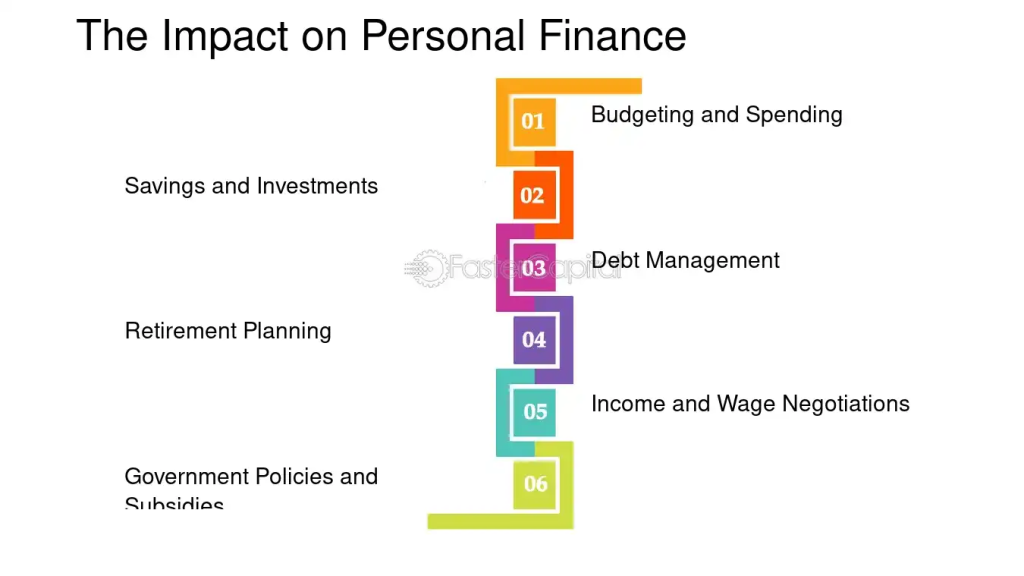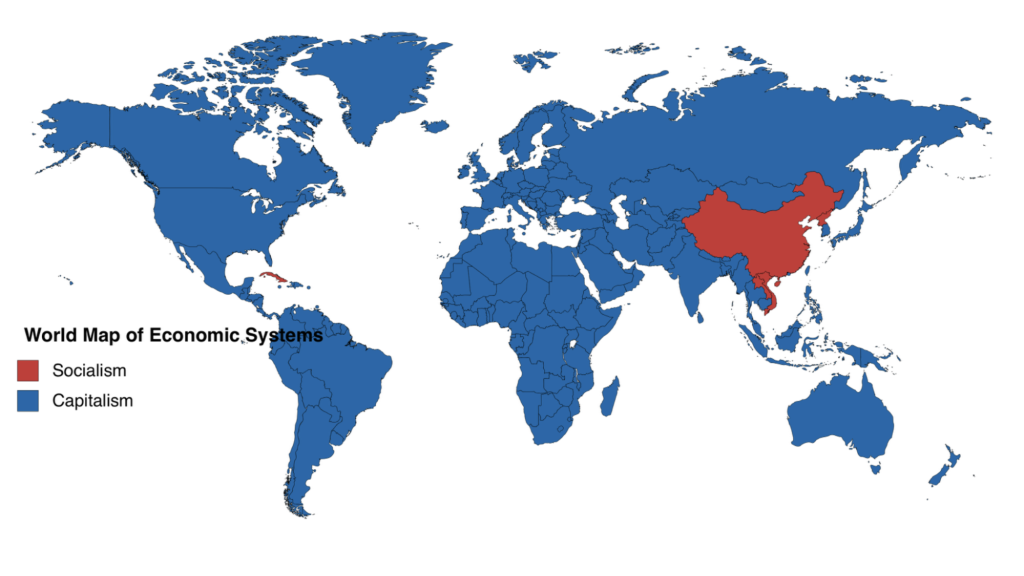გლობალური: სამთავრობო პოლიტიკის გავლენა პირად ფინანსებზე
გაკვეთილის სწავლის მიზნები:
შესავალი: This section explores how government policies shape personal finance, focusing on how individuals can influence policies, understand their impacts, and adapt personal finance strategies accordingly. By grasping these concepts, users can make informed financial decisions and promote fair financial regulations.
- Learn How to Influence Government Policies: Understand how individuals can engage in public advocacy, participate in consultations, and collaborate with organizations to shape policies affecting personal finance. This is useful for driving changes that protect financial rights and improve regulations.
- Understand the Impact of Government Policy on Personal Finance: გაეცანით, თუ როგორ საგადასახადო პოლიტიკა, social benefitsდა საპროცენტო განაკვეთის ცვლილებები affect financial decisions. This knowledge will help users adapt their budgeting, savingsდა investment strategies according to policy changes.
- Analyze Economic Systems and Their Influence on Personal Wealth: Learn about different economic systems, such as capitalism, socialismდა mixed economies, and how they shape personal wealth. Users will understand how to adjust their financial strategies based on market opportunities and risks associated with each system.
- Recognize Economic Cycles and Adjust Personal Finances: Identify how economic cycles—like growth and recessions—affect income, investments, and wealth. Users will gain insights into adjusting financial plans during different phases of the economic cycle to protect and grow their wealth.
A. Influencing Government Policy
In many countries, individuals and organizations can play a role in influencing government policies that affect personal finance. Engaging in advocacy, participating in consultations, and supporting relevant organizations can shape policies that promote financial well-being and consumer protection.
- Public Advocacy: Citizens can advocate for changes in government policy by joining consumer protection groups, financial literacy organizations, or lobbying for regulations that provide better financial safeguards. This can lead to changes in tax policies, social benefits, or financial regulations that affect personal finances.
- Consultations and Public Input: Governments often hold public consultations before implementing new policies. This allows individuals and businesses to voice concerns, provide feedback, and suggest modifications to proposed regulations that may impact personal finance, such as pension reforms, tax changes, or housing policies.
- მაგალითი: ში ამერიკის შეერთებული შტატები, individuals can submit comments during consultations on proposed changes to retirement savings rules, such as updates to 401(k) ან IRA contribution limits.
- მაგალითი: ში ამერიკის შეერთებული შტატები, individuals can submit comments during consultations on proposed changes to retirement savings rules, such as updates to 401(k) ან IRA contribution limits.
- Influence of Financial Institutions: Large financial institutions and industry associations also influence government policy through lobbying and advocacy. These institutions may push for reforms that impact personal finance, such as regulations on mortgage lending or interest rate adjustments.

ფიგურა: How Successful Businesses Are Embracing the Change: Policy Advocacy Promoting Inclusive Policies and Regulations
აღწერა:
The figure illustrates the steps that successful businesses take to engage in policy advocacy to promote inclusive policies and regulations. It includes understanding the importance of policy advocacy, collaborating with government bodies, engaging in public consultations, supporting non-profit organizations, and building external partnerships. Each step emphasizes the need for businesses to be proactive and cooperative in driving social and economic change through effective policy measures.
ძირითადი დასკვნები:
- Understanding policy advocacy is essential for businesses that wish to drive positive change.
- Collaboration with government bodies helps ensure that businesses’ interests are aligned with broader policy goals.
- Engaging in public consultations fosters transparency and community involvement in decision-making.
- Supporting non-profits allows businesses to champion social causes and expand their impact.
- Building partnerships enhances a business’s ability to address social issues comprehensively.
- Understanding policy advocacy is essential for businesses that wish to drive positive change.
- Collaboration with government bodies helps ensure that businesses’ interests are aligned with broader policy goals.
- Engaging in public consultations fosters transparency and community involvement in decision-making.
- Supporting non-profits allows businesses to champion social causes and expand their impact.
- Building partnerships enhances a business’s ability to address social issues comprehensively.
ინფორმაციის გამოყენება:
Businesses can apply these strategies to advocate for changes that benefit both their operations and the community. Understanding the policy landscape, engaging stakeholders, and collaborating with partners can lead to more sustainable and inclusive growth, ensuring that businesses remain aligned with evolving regulations and public expectations.
B. Relationship Between Personal Finance and Government Policy
Government policies have a direct impact on personal financial decisions and outcomes, affecting everything from taxation to social welfare benefits and housing markets. Understanding the connection between government policies and personal finance is crucial for making informed decisions.
- Tax Policies: Government tax policies, such as income tax rates, property taxes, and capital gains taxes, directly affect how much individuals retain from their earnings and investments. Changes in tax policy can alter household budgeting and financial planning. For example, reductions in tax rates can increase disposable income, while new taxes on certain goods or investments may reduce profitability.
- მაგალითი: ში კანადა, changes to the capital gains tax could influence decisions about when to sell investments, as higher taxes might reduce net returns.
- მაგალითი: ში კანადა, changes to the capital gains tax could influence decisions about when to sell investments, as higher taxes might reduce net returns.
- Social Benefits and Welfare: Policies governing social security, unemployment benefitsდა pension systems play a key role in financial stability for individuals. Government reforms, such as raising the retirement age or changing contribution rates for pensions, can significantly impact long-term financial planning for retirement.
- მაგალითი: The introduction of universal basic income (UBI) programs in countries like Finland has provided a safety net that helps individuals navigate economic uncertainty, but also influences personal saving and investment strategies.
- მაგალითი: The introduction of universal basic income (UBI) programs in countries like Finland has provided a safety net that helps individuals navigate economic uncertainty, but also influences personal saving and investment strategies.
- Interest Rate and Monetary Policy: Central banks, like the ფედერალური რეზერვი ან European Central Bank, influence personal finance by adjusting საპროცენტო განაკვეთები. When rates are lowered, borrowing becomes cheaper, encouraging spending and investment. Conversely, higher interest rates increase the cost of loans and mortgages, encouraging saving but potentially slowing down consumer spending.
- მაგალითი: ში ევროზონა, when the ევროპის ცენტრალური ბანკი cuts interest rates to stimulate economic activity, homeowners with variable-rate mortgages benefit from lower payments, while savers may earn lower returns on deposits.
- მაგალითი: ში ევროზონა, when the ევროპის ცენტრალური ბანკი cuts interest rates to stimulate economic activity, homeowners with variable-rate mortgages benefit from lower payments, while savers may earn lower returns on deposits.
- Regulations on Financial Products: Governments regulate financial markets and products such as loans, insurance, and investments. Policies aimed at protecting consumers, like capping credit card interest rates ან enhancing transparency requirements for investments, directly influence personal financial decisions.
Lorem ipsum dolor sit amet, consectetur adipiscing elit. Ut elit tellus, luctus nec ullamcorper mattis, pulvinar dapibus leo.

Figure: The Impact on Personal Finance
აღწერა:
The figure outlines six key areas of personal finance that are influenced by economic factors and individual decisions. These areas include budgeting and spending, savings and investments, debt management, retirement planning, income and wage negotiations, and the effects of government policies and subsidies. Each aspect contributes to how individuals manage their financial well-being, and understanding these elements is essential for effective financial planning.
ძირითადი დასკვნები:
- Budgeting and spending are fundamental to managing personal finances effectively.
- Savings and investments ensure financial security and growth over time.
- Debt management helps in maintaining a good credit score and avoiding financial pitfalls.
- Retirement planning is crucial for long-term financial stability.
- Income and wage negotiations play a significant role in achieving fair compensation.
- Government policies and subsidies can impact financial decisions and cost of living.
ინფორმაციის გამოყენება:
Understanding these areas helps individuals make informed decisions about their personal finances. By focusing on effective budgeting, investment strategies, and debt management, users can achieve better financial stability and security. Knowledge of government policies and wage negotiations can also assist in planning for future financial goals.
C. Economic Systems and Personal Wealth
The structure of a country’s economic system—whether it leans toward capitalism, socialism, or a mixed economy—can have profound effects on individual personal wealth. Economic systems determine how wealth is distributed, how markets operate, and the role of government intervention in personal finance.
- Capitalist Systems: In capitalist economies, personal wealth is largely influenced by market forces, private ownership, and individual entrepreneurship. People in these systems typically have access to a wide range of financial products, investment opportunities, and credit. However, there can also be significant disparities in wealth distribution.
-
- მაგალითი: ში the United States, a capitalist economy, individuals are encouraged to build wealth through private investments, retirement accounts, and entrepreneurial ventures. However, this system also exposes individuals to risks, such as economic recessions or market volatility.
- მაგალითი: ში the United States, a capitalist economy, individuals are encouraged to build wealth through private investments, retirement accounts, and entrepreneurial ventures. However, this system also exposes individuals to risks, such as economic recessions or market volatility.
- Socialist Systems: In socialist economies, wealth distribution tends to be more equal, with greater government involvement in providing basic needs like healthcare, education, and pensions. Personal finance in such systems is often shaped by state programs rather than individual financial products, reducing the need for private savings but also limiting the scope for wealth accumulation.
- მაგალითი: ში Norway, a social democratic system, the state provides extensive social welfare programs, reducing individual reliance on private pensions or savings for healthcare. However, high taxes may limit disposable income and wealth accumulation.
- მაგალითი: ში Norway, a social democratic system, the state provides extensive social welfare programs, reducing individual reliance on private pensions or savings for healthcare. However, high taxes may limit disposable income and wealth accumulation.
- Mixed Economies: Most economies fall somewhere between capitalism and socialism, with both private sector და government involvement in the financial markets. In these systems, individuals are responsible for managing personal finances through a combination of public and private resources.
- მაგალითი: ში გერმანია, the mixed economy provides strong public pension and healthcare systems, while also encouraging private savings and investments for retirement. Citizens balance their financial planning between government-provided benefits and private financial products.
- მაგალითი: ში გერმანია, the mixed economy provides strong public pension and healthcare systems, while also encouraging private savings and investments for retirement. Citizens balance their financial planning between government-provided benefits and private financial products.
- Impact of Economic Cycles: Personal wealth is often influenced by economic cycles—periods of growth followed by recession. During economic expansions, individuals can build wealth through rising stock markets, higher wages, and increased asset values. However, during recessions, individuals may face income losses, reduced investment returns, or declines in property values, requiring adjustments to financial plans.
- მაგალითი: During the 2008 financial crisis, many homeowners in countries like the United States and Spain experienced declines in home values, while stock markets plummeted, impacting personal wealth and retirement savings.

Figure: World Map of Economic Systems
აღწერა:
The figure is a world map highlighting the dominant economic systems across different countries. Countries marked in blue represent those following a capitalist economic system, where private ownership and free markets dominate. The countries shaded in red represent socialist systems, where the government has greater control over the economy. The map visually indicates that the majority of the world follows capitalist systems, with fewer nations practicing socialism.
ძირითადი დასკვნები:
- Capitalism is the dominant economic system across most countries globally.
- Socialism is prevalent in fewer countries, typically where the government plays a more active role in economic management.
- Geographical distribution of economic systems can influence trade relations and investment opportunities.
ინფორმაციის გამოყენება:
გაგება global distribution of economic systems helps investors and businesses plan strategies for expansion and trade. Knowing whether a country operates under capitalism or socialism can inform decisions about market potential, government regulation, and risk assessment.
გაკვეთილის ძირითადი ინფორმაცია:
- Public Advocacy and Engagement allow individuals to actively shape policies impacting personal finance. By participating in public consultations, users can support changes that improve financial well-being, such as better tax laws or social benefits.
- Government Policies Directly Affect Personal Finances through taxation, social benefits, and monetary policies. For example, changes in tax rates can alter disposable income, while interest rate adjustments influence borrowing costs and savings returns. Being aware of these impacts helps users make informed financial decisions.
- Economic Systems Influence Wealth Distribution: შიგნით capitalist economies, personal wealth depends largely on individual entrepreneurship and investments, while in socialist systems, wealth distribution is more equal but may limit personal accumulation. In mixed economies, users balance private wealth-building with government benefits, shaping financial planning strategies.
- Economic Cycles Require Financial Adjustments: During economic expansions, users can capitalize on investment growth და rising wages, while during recessions, they may need to reduce spending and adjust investments. Understanding these cycles aids in protecting financial stability over time.
- Adapting to Policy Changes is crucial for financial resilience. Policies such as retirement reforms or universal basic income programs impact savings, spending, and investment decisions. Staying informed enables users to adjust personal finance plans to align with new regulations and maximize financial outcomes.
დასკვნითი განცხადება:
Understanding how government policies and economic systems shape personal finance helps individuals make smarter financial decisions. By adapting to policy changes, economic cycles, and regulatory environments, users can achieve better financial stability and long-term success.

